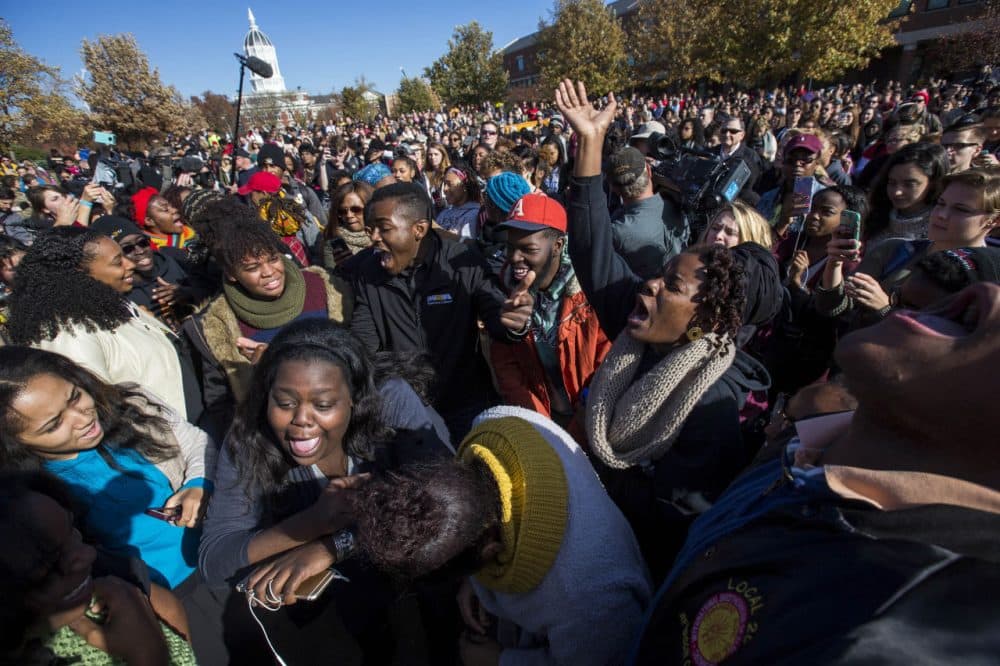Advertisement
Racial Politics And The New College Activism
Resume
Protests against racial and cultural insensitivity are planned on more than 20 college campuses around the country this weekend.
This comes after protests at Yale University and Ithaca College sparked national headlines, and the president of the University of Missouri resigned in the face of student activism.
In his resignation speech earlier this week, former University of Missouri president Timothy Wolfe took responsibility for the protests on campus but also spoke out against a hunger strike by some students.
Interview Highlights
Why is the frustration coming to a head right now?
“The way I take that question is, why hasn’t it come up sooner? Which is to say that, one of the things that has happened in the media around these issues is to just imagine that these are miniature slights, and that students are just exploding from nothing out of context. But if you look at most of these campuses, students have a record of long term investment trying to make changes, and I think now it has everything to do with a combination of factors. The Missouri case was very inspirational with the athletes, but we’re also ending the Obama era and people are realizing that they’re going to have to do this, this isn’t going to be a symbolic figurehead presidential context, and that a lot has gotten worse.”
On the dean at Claremont McKenna resigning over an email to a Latino student
“I think that language suggests there is a fixed mold, a mold is itself a fixed structure that you pour things into and create an outcome, and these are people who simply don’t fit that mold and we’re going to try to help them, but they’ve already been identified as outsiders and as people in need of fixing - rather than a system that excludes and marginalizes some existing members of the community. Basically, if you’ve admitted a student to Claremont, or to Brown, or wherever, they’re a part of the community. Now either they’re 100 percent part of the community or their not. If they’re 100 percent part of the community, then the mold must be different, and once that’s the case then you wouldn’t say something like that. You would basically acknowledge you have a wide range of people, and you have to work together to create a civil, just, fair, competent, not only listening but proactive context.
So it was a poor choice of words on the dean’s part
“But again, it’s not just those words. I’m sure this one individual dean is not what this protest is about. They have been concerned about many, many things for a long time, so we don’t want to over read one incident.”
On the students’ long term goals
“I don’t think there’s a systemic plan that everybody is reading from a playbook. I think what many of these requests are about are a set of behaviors, institutional actions that will change the climate and the context for their experience on the campus. So that means making it clear that when the institutions speak this, or in ways like the Yale incident, that there are consequences, you can’t just create additional climates of disrespect, hostility and disregard, from an institutional standpoint. So that’s one thing.
"But they’re also asking for the study of people of color to be an important part of the curriculum, not marginal, not segregated, not a handful, not isolated from the so-called traditional, so-called mainstream disciplines. And they’re asking for attention to the ways their economic conditions may impact, the way fraternities and sororities may be responding to students of color. They’re basically, the mentorship gap, they’re basically responding across a wide range of facets to say these things work together to create a very problematic and detrimental climate for us on this campus."
What about people that say college is a time to cope in a tough world, not be coddled?
“The university is a sequestered place where we’re intending to develop young people’s minds and their spirits. And in that sense we have an obligation on these campuses to make it as relatively safe as possible, there’s no place that’s going to be safe. But we are not meant to be an incubator for all the ails of the world, at the same time we’re holding them to incredibly high intellectual standards and personal growth standards.”
Guest
- Tricia Rose, author of the book “The Hip Hop Wars,” professor of Africana studies and director of the Center for the Study of Race and Ethnicity in America at Brown University. She tweets @ProfTriciaRose.
This segment aired on November 13, 2015.